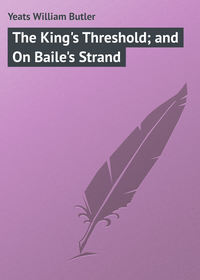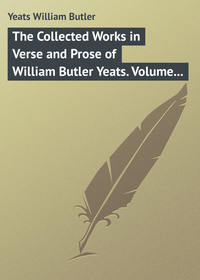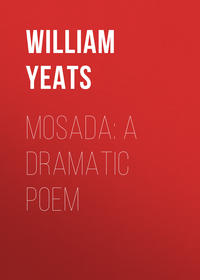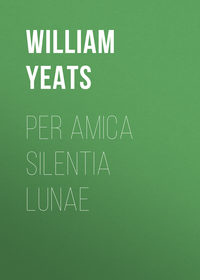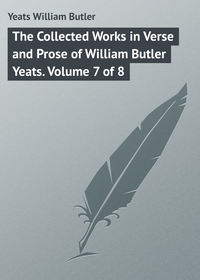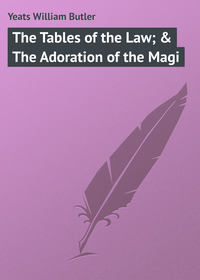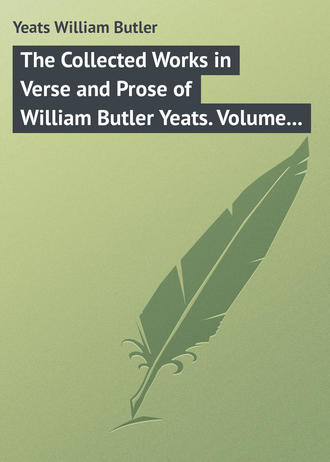 полная версия
полная версияThe Collected Works in Verse and Prose of William Butler Yeats. Volume 8 of 8. Discoveries. Edmund Spenser. Poetry and Tradition; and Other Essays. Bibliography
WHY THE BLIND MAN IN ANCIENT TIMES WAS MADE A POET
A description in the Iliad or the Odyssey, unlike one in the Æneid or in most modern writers, is the swift and natural observation of a man as he is shaped by life. It is a refinement of the primary hungers and has the least possible of what is merely scholarly or exceptional. It is, above all, never too observant, too professional, and when the book is closed we have had our energies enriched, for we have been in the mid-current. We have never seen anything Odysseus could not have seen while his thought was of the Cyclops, or Achilles when Briseis moved him to desire. In the heart of the greatest periods there is something careless and sudden in all habitual moods though not in their expression, because these moods are a conflagration of all the energies of active life. In primitive times the blind man became a poet as he becomes a fiddler in our villages, because he had to be driven out of activities all his nature cried for before he could be contented with the praise of life. And often it is Villon or Verlaine with impediments plain to all, who sings of life with the ancient simplicity. Poets of coming days, when once more it will be possible to write as in the great epochs, will recognise that their sacrifice shall be to refuse what blindness and evil name, or imprisonment at the outsetting, denied to men who missed thereby the sting of a deliberate refusal. The poets of the ages of silver need no refusal of life, the dome of many-coloured glass is already shattered while they live. They look at life deliberately and as if from beyond life, and the greatest of them need suffer nothing but the sadness that the saints have known. This is their aim, and their temptation is not a passionate activity, but the approval of their fellows, which comes to them in full abundance only when they delight in the general thoughts that hold together a cultivated middle-class, where irresponsibilities of position and poverty are lacking; the things that are more excellent among educated men who have political pre-occupations, Augustus Cæsar’s affability, all that impersonal fecundity which muddies the intellectual passions. Ben Jonson says in the ‘Poetaster,’ that even the best of men without Promethean fire is but a hollow statue, and a studious man will commonly forget after some forty winters that of a certainty Promethean fire will burn somebody’s fingers. It may happen that poets will be made more often by their sins than by their virtues, for general praise is unlucky, as the villages know, and not merely as I imagine – for I am superstitious about these things – because the praise of all but an equal enslaves and adds a pound to the ball at the ankle with every compliment.
All energy that comes from the whole man is as irregular as the lightning, for the communicable and forecastable and discoverable is a part only, a hungry chicken under the breast of the pelican, and the test of poetry is not in reason but in a delight not different from the delight that comes to a man at the first coming of love into the heart. I knew an old man who had spent his whole life cutting hazel and privet from the paths, and in some seventy years he had observed little but had many imaginations. He had never seen like a naturalist, never seen things as they are, for his habitual mood had been that of a man stirred in his affairs; and Shakespeare, Tintoretto, though the times were running out when Tintoretto painted, nearly all the great men of the Renaissance, looked at the world with eyes like his. Their minds were never quiescent, never as it were in a mood for scientific observations, always an exaltation, never – to use known words – founded upon an elimination of the personal factor; and their attention and the attention of those they worked for dwelt constantly with what is present to the mind in exaltation. I am too modern fully to enjoy Tintoretto’s Creation of the Milky Way, I cannot fix my thoughts upon that glowing and palpitating flesh intently enough to forget, as I can the make-believe of a fairy tale, that heavy drapery hanging from a cloud, though I find my pleasure in King Lear heightened by the make-believe that comes upon it all when the fool says: ‘This prophecy Merlin shall make, for I live before his time’; – and I always find it quite natural, so little does logic in the mere circumstance matter in the finest art, that Richard’s and Richmond’s tents should be side by side. I saw with delight The Knight of the Burning Pestle when Mr. Carr revived it, and found it none the worse because the apprentice acted a whole play upon the spur of the moment and without committing a line to heart. When Ben Jonson’s Epicœne rammed a century of laughter into the two hours’ traffic, I found with amazement that almost every journalist had put logic on the seat, where our lady imagination should pronounce that unjust and favouring sentence her woman’s heart is ever plotting, and had felt bound to cherish none but reasonable sympathies and to resent the baiting of that grotesque old man. I have been looking over a book of engravings made in the eighteenth century from those wall-pictures of Herculaneum and Pompeii that were, it seems, the work of journeymen copying from finer paintings, for the composition is always too good for the execution. I find in great numbers an indifference to obvious logic, to all that the eye sees at common moments. Perseus shows Andromeda the death she lived by in a pool, and though the lovers are carefully drawn the reflection is upside down that we may see it the better. There is hardly an old master who has not made known to us in some like way how little he cares for what every fool can see and every knave can praise. The men who imagined the arts were not less superstitious in religion, understanding the spiritual relations, but not the mechanical, and finding nothing that need strain the throat in those gnats the floods of Noah and Deucalion, and in Joshua’s moon at Ascalon.
CONCERNING SAINTS AND ARTISTS
I took the Indian hemp with certain followers of St. Martin on the ground floor of a house in the Latin Quarter. I had never taken it before, and was instructed by a boisterous young poet, whose English was no better than my French. He gave me a little pellet, if I am not forgetting, an hour before dinner, and another after we had dined together at some restaurant. As we were going through the streets to the meeting-place of the Martinists, I felt suddenly that a cloud I was looking at floated in an immense space, and for an instant my being rushed out, as it seemed, into that space with ecstasy. I was myself again immediately, but the poet was wholly above himself, and presently he pointed to one of the street lamps now brightening in the fading twilight, and cried at the top of his voice, ‘Why do you look at me with your great eye?’ There were perhaps a dozen people already much excited when we arrived; and after I had drunk some cups of coffee and eaten a pellet or two more, I grew very anxious to dance, but did not, as I could not remember any steps. I sat down and closed my eyes; but no, I had no visions, nothing but a sensation of some dark shadow which seemed to be telling me that some day I would go into a trance and so out of my body for awhile, but not yet. I opened my eyes and looked at some red ornament on the mantelpiece, and at once the room was full of harmonies of red, but when a blue china figure caught my eye the harmonies became blue upon the instant. I was puzzled, for the reds were all there, nothing had changed, but they were no longer important or harmonious; and why had the blues so unimportant but a moment ago become exciting and delightful? Thereupon it struck me that I was seeing like a painter, and that in the course of the evening everyone there would change through every kind of artistic perception.
After a while a Martinist ran towards me with a piece of paper on which he had drawn a circle with a dot in it, and pointing at it with his finger he cried out, ‘God, God!’ Some immeasurable mystery had been revealed, and his eyes shone; and at some time or other a lean and shabby man, with rather a distinguished face, showed me his horoscope and pointed with an ecstasy of melancholy at its evil aspects. The boisterous poet, who was an old eater of the Indian hemp, had told me that it took one three months growing used to it, three months more enjoying it, and three months being cured of it. These men were in their second period; but I never forgot myself, never really rose above myself for more than a moment, and was even able to feel the absurdity of that gaiety, an Herr Nordau among the men of genius, but one that was abashed at his own sobriety. The sky outside was beginning to grey when there came a knocking at the window shutters. Somebody opened the window, and a woman in evening dress, who was not a little bewildered to find so many people, was helped down into the room. She had been at a students’ ball unknown to her husband, who was asleep overhead, and had thought to have crept home unobserved, but for a confederate at the window. All those talking or dancing men laughed in a dreamy way; and she, understanding that there was no judgment in the laughter of men that had no thought but of the spectacle of the world, blushed, laughed and darted through the room and so upstairs. Alas that the hangman’s rope should be own brother to that Indian happiness that keeps alone, were it not for some stray cactus, mother of as many dreams, an immemorial impartiality and simpleness.
THE SUBJECT MATTER OF DRAMA
I read this sentence a few days ago, or one like it, in an obituary of Ibsen: ‘Let nobody again go back to the old ballad material of Shakespeare, to murders, and ghosts, for what interests us on the stage is modern experience and the discussion of our interests’; and in another part of the article Ibsen was blamed because he had written of suicides and in other ways made use of ‘the morbid terror of death.’ Dramatic literature has for a long time been left to the criticism of journalists, and all these, the old stupid ones and the new clever ones, have tried to impress upon it their absorption in the life of the moment, their delight in obvious originality and in obvious logic, their shrinking from the ancient and insoluble. The writer I have quoted is much more than a journalist, but he has lived their hurried life, and instinctively turns to them for judgment. He is not thinking of the great poets and painters, of the cloud of witnesses, who are there that we may become, through our understanding of their minds, spectators of the ages, but of this age. Drama is a means of expression, not a special subject matter, and the dramatist is as free to choose where he has a mind to as the poet of ‘Endymion’ or as the painter of Mary Magdalene at the door of Simon the Pharisee. So far from the discussion of our interests and the immediate circumstance of our life being the most moving to the imagination, it is what is old and far off that stirs us the most deeply. There is a sentence in The Marriage of Heaven and Hell that is meaningless until we understand Blake’s system of correspondences. ‘The best wine is the oldest, the best water the newest.’
Water is experience, immediate sensation, and wine is emotion, and it is with the intellect, as distinguished from imagination, that we enlarge the bounds of experience and separate it from all but itself, from illusion, from memory, and create among other things science and good journalism. Emotion, on the other hand, grows intoxicating and delightful after it has been enriched with the memory of old emotions, with all the uncounted flavours of old experience, and it is necessarily an antiquity of thought, emotions that have been deepened by the experiences of many men of genius, that distinguishes the cultivated man. The subject-matter of his meditation and invention is old, and he will disdain a too conscious originality in the arts as in those matters of daily life where, is it not Balzac who says, ‘we are all conservatives’? He is above all things well-bred, and whether he write or paint will not desire a technique that denies or obtrudes his long and noble descent. Corneille and Racine did not deny their masters, and when Dante spoke of his master Virgil there was no crowing of the cock. In their day imitation was conscious or all but conscious, and while originality was but so much the more a part of the man himself, so much the deeper because unconscious, no quick analysis could find out their miracle, that needed, it may be, generations to reveal; but it is our imitation that is unconscious and that waits the certainties of time. The more religious the subject-matter of an art, the more will it be as it were stationary, and the more ancient will be the emotion that it arouses and the circumstances that it calls up before our eyes. When in the Middle Ages the pilgrim to St. Patrick’s Purgatory found himself on the lake side, he found a boat made out of a hollow tree to ferry him to the cave of vision. In religious painting and poetry, crowns and swords of an ancient pattern take upon themselves new meanings, and it is impossible to separate our idea of what is noble from a mystic stair, where not men and women, but robes, jewels, incidents, ancient utilities float upward slowly over the all but sleeping mind, putting on emotional and spiritual life as they ascend until they are swallowed up by some far glory that they even were too modern and momentary to endure. All art is dream, and what the day is done with is dreaming ripe, and what art moulds religion accepts, and in the end all is in the wine cup, all is in the drunken phantasy, and the grapes begin to stammer.
THE TWO KINDS OF ASCETICISM
It is not possible to separate an emotion or a spiritual state from the image that calls it up and gives it expression. Michael Angelo’s Moses, Velasquez’ Philip the Second, the colour purple, a crucifix, call into life an emotion or state that vanishes with them because they are its only possible expression, and that is why no mind is more valuable than the images it contains. The imaginative writer differs from the saint in that he identifies himself – to the neglect of his own soul, alas! – with the soul of the world, and frees himself from all that is impermanent in that soul, an ascetic not of women and wine, but of the newspapers. That which is permanent in the soul of the world upon the other hand, the great passions that trouble all and have but a brief recurring life of flower and seed in any man, is the renunciation of the saint who seeks not an eternal art, but his own eternity. The artist stands between the saint and the world of impermanent things, and just in so far as his mind dwells on what is impermanent in his sense, on all that ‘modern experience and the discussion of our interests,’ that is to say on what never recurs, as desire and hope, terror and weariness, spring and autumn, recur in varying rhythms, will his mind become critical, as distinguished from creative, and his emotions wither. He will think less of what he sees and more of his own attitude towards it, and will express this attitude by an essentially critical selection and emphasis. I am not quite sure of my memory, but I think that Mr. Ricketts has said in his book on the Prado that he feels the critic in Velasquez for the first time in painting, and we all feel the critic in Whistler and Degas, in Browning, even in Mr. Swinburne, in the finest art of all ages but the greatest. The end for art is the ecstasy awakened by the presence before an ever-changing mind of what is permanent in the world, or by the arousing of that mind itself into the very delicate and fastidious mood habitual with it when it is seeking those permanent and recurring things. There is a little of both ecstasies at all times, but at this time we have a small measure of the creative impulse itself, of the divine vision, a great one of ‘the lost traveller’s dream under the hill,’ perhaps because all the old simple things have been painted or written, and they will only have meaning for us again when a new race or a new civilisation has made us look upon all with new eyesight.
IN THE SERPENT’S MOUTH
There is an old saying that God is a circle whose centre is everywhere. If that is true, the saint goes to the centre, the poet and artist to the ring where everything comes round again. The poet must not seek for what is still and fixed, for that has no life for him; and if he did, his style would become cold and monotonous, and his sense of beauty faint and sickly, as are both style and beauty to my imagination in the prose and poetry of Newman, but be content to find his pleasure in all that is for ever passing away that it may come again, in the beauty of woman, in the fragile flowers of spring, in momentary heroic passion, in whatever is most fleeting, most impassioned, as it were, for its own perfection, most eager to return in its glory. Yet perhaps he must endure the impermanent a little, for these things return, but not wholly, for no two faces are alike, and, it may be, had we more learned eyes, no two flowers. Is it that all things are made by the struggle of the individual and the world, of the unchanging and the returning, and that the saint and the poet are over all, and that the poet has made his home in the Serpent’s mouth?
THE BLACK AND THE WHITE ARROWS
Instinct creates the recurring and the beautiful, all the winding of the serpent; but reason, the most ugly man, as Blake called it, is a drawer of the straight line, the maker of the arbitrary and the impermanent, for no recurring spring will ever bring again yesterday’s clock. Sanctity has its straight line also, darting from the centre, and with these arrows the many-coloured serpent, theme of all our poetry, is maimed and hunted. He that finds the white arrow shall have wisdom older than the Serpent, but what of the black arrow? How much knowledge, how heavy a quiver of the crow-feathered ebony rods can the soul endure?
HIS MISTRESS’S EYEBROWS
The preoccupation of our Art and Literature with knowledge, with the surface of life, with the arbitrary, with mechanism, has arisen out of the root. A careful, but not necessarily very subtle man, could foretell the history of any religion if he knew its first principle, and that it would live long enough to fulfil itself. The mind can never do the same thing twice over, and having exhausted simple beauty and meaning, it passes to the strange and hidden, and at last must find its delight, having outrun its harmonies in the emphatic and discordant. When I was a boy at the art school I watched an older student late returned from Paris, with a wonder that had no understanding in it. He was very amorous, and every new love was the occasion of a new picture, and every new picture was uglier than its forerunner. He was excited about his mistress’s eyebrows, as was fitting, but the interest of beauty had been exhausted by the logical energies of Art, which destroys where it has rummaged, and can but discover, whether it will or no. We cannot discover our subject-matter by deliberate intellect, for when a subject-matter ceases to move us we must go elsewhere, and when it moves us, even though it be ‘that old ballad material of Shakespeare’ or even ‘the morbid terror of death,’ we can laugh at reason. We must not ask is the world interested in this or that, for nothing is in question but our own interest, and we can understand no other. Our place in the Hierarchy is settled for us by our choice of a subject-matter, and all good criticism is hieratic, delighting in setting things above one another, Epic and Drama above Lyric and so on, and not merely side by side. But it is our instinct and not our intellect that chooses. We can deliberately refashion our characters, but not our painting or our poetry. If our characters also were not unconsciously refashioned so completely by the unfolding of the logical energies of Art, that even simple things have in the end a new aspect in our eyes, the Arts would not be among those things that return for ever. The ballads that Bishop Percy gathered returned in the Ancient Mariner and the delight in the world of old Greek sculptors sprang into a more delicate loveliness in that archaistic head of the young athlete down the long corridor to your left hand as you go into the British Museum. Civilisation too, will not that also destroy where it has loved, until it shall bring the simple and natural things again and a new Argo with all the gilding on her bows sail out to find another fleece?
THE TRESSES OF THE HAIR
Hafiz cried to his beloved, ‘I made a bargain with that brown hair before the beginning of time, and it shall not be broken through unending time,’ and it may be that Mistress Nature knows that we have lived many times, and that whatsoever changes and winds into itself belongs to us. She covers her eyes away from us, but she lets us play with the tresses of her hair.
A TOWER ON THE APENNINE
The other day I was walking towards Urbino, where I was to spend the night, having crossed the Apennines from San Sepolcro, and had come to a level place on the mountain-top near the journey’s end. My friends were in a carriage somewhere behind, on a road which was still ascending in great loops, and I was alone amid a visionary fantastic impossible scenery. It was sunset and the stormy clouds hung upon mountain after mountain, and far off on one great summit a cloud darker than the rest glimmered with lightning. Away south upon another mountain a mediæval tower, with no building near nor any sign of life, rose into the clouds. I saw suddenly in the mind’s eye an old man, erect and a little gaunt, standing in the door of the tower, while about him broke a windy light. He was the poet who had at last, because he had done so much for the world’s sake, come to share in the dignity of the saint. He had hidden nothing of himself, but he had taken care of ‘that dignity … the perfection of form … this lofty and severe quality … this virtue.’ And though he had but sought it for the world’s sake, or for a woman’s praise, it had come at last into his body and his mind. Certainly as he stood there he knew how from behind that laborious mood, that pose, that genius, no flower of himself but all himself, looked out as from behind a mask that other Who alone of all men, the country people say, is not a hair’s breadth more nor less than six feet high. He has in his ears well instructed voices and seeming solid sights are before his eyes, and not as we say of many a one, speaking in metaphor, but as this were Delphi or Eleusis, and the substance and the voice come to him among his memories which are of women’s faces; for was it Columbanus or another that wrote ‘There is one among the birds that is perfect, and one perfect among the fish’?
THE THINKING OF THE BODY
Those learned men who are a terror to children and an ignominious sight in lovers’ eyes, all those butts of a traditional humour where there is something of the wisdom of peasants, are mathematicians, theologians, lawyers, men of science of various kinds. They have followed some abstract reverie, which stirs the brain only and needs that only, and have therefore stood before the looking-glass without pleasure and never known those thoughts that shape the lines of the body for beauty or animation, and wake a desire for praise or for display.
There are two pictures of Venice side by side in the house where I am writing this, a Canaletto that has little but careful drawing, and a not very emotional pleasure in clean bright air, and a Franz Francken, where the blue water, that in the other stirs one so little, can make one long to plunge into the green depth where a cloud shadow falls. Neither painting could move us at all, if our thought did not rush out to the edges of our flesh, and it is so with all good art, whether the Victory of Samothrace which reminds the soles of our feet of swiftness, or the Odyssey that would send us out under the salt wind, or the young horsemen on the Parthenon, that seem happier than our boyhood ever was, and in our boyhood’s way. Art bids us touch and taste and hear and see the world, and shrinks from what Blake calls mathematic form, from every abstract thing, from all that is of the brain only, from all that is not a fountain jetting from the entire hopes, memories, and sensations of the body. Its morality is personal, knows little of any general law, has no blame for Little Musgrave, no care for Lord Barnard’s house, seems lighter than a breath and yet is hard and heavy, for if a man is not ready to face toil and risk, and in all gaiety of heart, his body will grow unshapely and his heart lack the wild will that stirs desire. It approved before all men those that talked or wrestled or tilted under the walls of Urbino, or sat in the wide window-seats discussing all things, with love ever in their thought, when the wise Duchess ordered all, and the Lady Emilia gave the theme.


